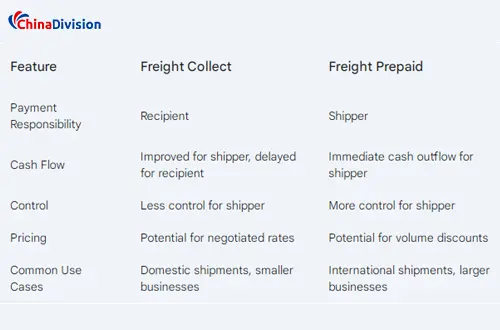The Difference Between Freight Collect and Freight Prepaid in Shipping
Freight Collect and Freight Prepaid are two basic shipping terms that determine who bears the shipping costs. Freight Collect and Freight Prepaid are two very different payment methods. The former means that the freight is borne by the consignee and paid after the goods arrive at the destination; the latter means that the consignor pays all freight costs in advance before the goods are shipped. Both methods have their pros and cons and are suitable for different business scenarios and needs. Understanding the difference between Freight Collect and Freight Prepaid is crucial for businesses and e-commerce sellers.
This blog post will answer common doubts about these two methods, compare their pros and cons, and guide you to choose the right freight payment method for your business.
Table of Contents
What is Freight Collect?
It means that the transportation costs of the goods are borne by the consignee, that is, the consignee pays the freight after the goods arrive at the destination. Freight Collect requires the consignee (consignee) to pay the freight upon delivery. The carrier collects the freight from the consignee upon delivery.
What is Freight Prepaid?
Freight Prepaid means that the transportation costs of the goods are borne by the shipper, that is, the shipper pays all freight before the goods are shipped. Freight Prepaid requires the shipper (consignor) to pay the freight in advance before the goods are shipped. The cost is usually included in the consignee's invoice.
What are the advantages and disadvantages of Freight Collect?
Advantages:
Cash flow management: The shipper does not need to pay the freight in advance, which improves the shipper's cash flow and provides the consignee with the potential to negotiate rates, which helps maintain cash flow.
Consignee control: The consignee has more control over logistics costs and can negotiate better freight rates directly with the carrier.
Convenience advantage: Freight Collect is undoubtedly an extremely convenient payment method for the consignee. It allows the consignee to pay the freight after confirming that the goods are correct, reducing disputes and losses caused by cargo problems. For e-commerce buyers, this "check the goods first and pay later" model greatly improves the shopping experience, especially for users with low trust or first-time transactions.
Disadvantages:
Risk of non-payment: The consignee may refuse to pay the charges upon delivery, resulting in potential delays or disputes.
Delayed delivery: The shipper faces the risk of delayed payment or even delayed delivery of the goods, resulting in freight disputes. In addition, in some cases, the collection of freight collectibles may become complicated and difficult because the carrier bears the risk of loss of the goods.

What are the advantages and disadvantages of freight prepaid?
Advantages:
Smooth logistics processing: Since the freight is paid in advance, there is less risk of payment disputes, ensuring smoother logistics operations. Shippers have better control over transportation costs, faster delivery times, and the potential for volume discounts.
Shipper's control: The shipper retains control of the goods and can manage logistics without burdening the consignee.
Security advantage: Freight prepaid ensures that the shipper receives the freight before the goods are shipped, which greatly reduces the risk of collection. For high-value goods or long-distance transportation, prepaid freight has become the first choice because it can effectively protect the economic interests of the shipper from being harmed.
Disadvantages:
Cash flow impact: The shipper needs to have sufficient cash flow to pay the freight in advance.
Upfront costs: Shippers incur costs initially, which can affect their financial planning.
How to choose the right freight payment method?
When deciding between Freight Collect and Freight Prepaid, consider the following factors:
Business relationship
For new business relationships, Freight Collect may be more appropriate. For established business relationships, Freight Prepaid ensures smoother business.
Cash flow
Assess your cash flow situation. If maintaining cash flow is critical, Freight Collect may be a better option.
Volume of transportation
The larger the volume of transportation, the more likely you are to qualify for Freight Prepaid discounts.
Control
Determine who should control logistics costs. Freight Collect is ideal if the consignee wants to manage these costs.
Risk tolerance
Assess your risk tolerance. If you want to minimize the risk of payment disputes, choose Freight Prepaid.
Freight Frequently Asked Questions
What are the benefits of Freight Collect for consignees?
Freight Collect enables consignees to control logistics costs, thereby negotiating better rates with carriers. It also reduces the burden of prepayment for shippers.
How does Freight Collect affect shipping time?
Freight prepaid can sometimes lead to delays if payment issues arise at the time of delivery. Ensuring clear communication and agreement on payment terms can reduce this risk.
When should a business consider using freight prepaid?
Freight prepaid is suitable for merchants with clear credit terms and established business relationships, ensuring smooth logistics, no additional burden on the consignee, and reducing the risk of payment disputes. When cash flow allows, it can better control shipping costs, build stronger relationships with carriers, and qualify for volume discounts.
By carefully considering your business needs and working with a reliable logistics partner, you can choose the payment method that best suits your goals.
For further assistance in managing your shipping needs, contact ChinaDivision, your trusted international logistics partner. ChinaDivision provides comprehensive logistics solutions, including freight management services. Our expertise in freight management ensures that your shipments are handled efficiently and cost-effectively.





